Presented by “Harry Potter and the Reread Project”
When we left the Golden Trio in my last Harry Potter Reread post, Hermione had just suggested forming a secret study group in response to Umbridge and the Ministry of Magic refusing to teach them actual defensive magic. Despite Harry’s original lack of enthusiasm about the idea, Dumbledore’s Army takes center stage in the third of five parts of Order of the Phoenix, giving us not only the joy of Harry as a teacher but his first awkward romantic encounter as well as more nastiness stemming from Umbridge, more Weasley family drama and more angst on Harry’s part.
More Toady Evilness
As I pointed out at the end of my last Reread post, the second part of Order of the Phoenix largely lays the foundations for the rest of the book, making it a bit less interesting. To a certain extent, the same is true of the third part as well: many of the chapters are focused on the everyday and school life of the characters, their classes, the seemingly unsurmountable mountain of homework, and Quidditch practices.
At the same time, there’s a growing sense of insecurity, surveillance and mystery as Umbridge’s power grows while Voldemort remains mostly out of the picture. One way this is achieved is through making Umbridge almost omnipresent. During this part of the book, her inspections of other teachers become more frequent, leading to some hilarious exchanges (for example with McGonagall), as well as the deeply uncomfortable inspection of Hagrid’s Care of Magical Creatures lesson. During this, Umbridge consistently treats Hagrid as if he was too stupid to understand her by speaking extremely slowly and loudly to him and accompanying her words by gestures. She also immediately shows up on Hagrid’s doorstep when he returns to Hogwarts despite it being the middle of the night to interrogate him about where he was.
This sense of omnipresence becomes even stronger when Umbridge puts a ban on all student organisations that she hasn’t personally approved almost immediately after the first meeting of Dumbledore’s Army. She also attacks Hedwig to read Harry’s letters, hurting the owl and almost catching Sirius when he essentially uses floo powder to facetime Harry.
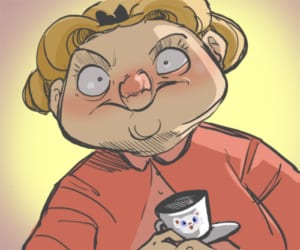
It’s something that makes Umbridge an incredibly effective villain: she’s always either keeping up with or one step ahead of the protagonists in ways that they don’t anticipate. This is also the case when Umbridge provides the Educational Decree that gives her the absolute authority over the punishment of students who break school rules, meaning that she can issue a lifelong Quidditch ban against Harry and the Weasley twins after he and George get into a physical fight with Malfoy.
Umbridge is also an effective villain because she absolutely undermines the idea of Hogwarts as a sanctuary. Her very presence shows that Hogwarts isn’t save from outside influence. The fact that she can also abuse Harry to the point of leaving actual lasting scars without anyone doing anything about it is even scarier as it shows that the teachers inside Hogwarts are also quite powerless to protect the students. And after she has banned Harry from Quidditch, it gets to the point where he barely wants to return to Hogwarts—a point that Harry never reached in any of the previous books, no matter what was going on.
Conflicting Conflicts
Additionally, Umbridge monitoring Harry’s communication specifically further isolates him from the Order in general and Sirius, the only Order member actually willing to give Harry any information in the first place, specifically. That in combination with the Daily Prophet’s silence and Dumbledore absolutely keeping his distance from Harry means that both the main characters and the readers don’t know what is going on outside of the school.
It’s an interesting contrast to the first fifth of the book that took place in Privet Drive and at Grimmauld Place. During this part, the threat that Voldemort presented to Wizarding society and the effects of his return were a lot more palpable. There is still a basic awareness of the threat that Voldemort presents but it’s something that Harry and his friends are far less preoccupied with than in the first part of the book.
Essentially, Order of the Phoenix contains two main conflicts—the fight against Voldemort and his Death Eaters and the Ministry and Umbridge trying to gain power in Hogwarts—alongside the everyday and school life of the characters. During roughly the first half of the book, the latter becomes the focus of the story, giving both the readers and the characters a sort of respite before plunging them back into the fight against Voldemort.
An Antifascist Study Group
Speaking of the fight against Voldemort, it’s only been during this reread that it really sunk in how gutsy and at the same time kind of sad it is that the DA was formed. After all, most of the characters are between 15 and 17; they should not have to teach each other how to defend themselves against the members of a fascist organization. They especially should not have to risk their school education to do so.
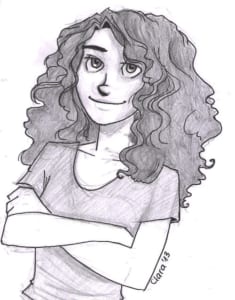
Of course one could argue that Dumbledore’s Army is just a study group meant to resist Umbridge and counteract the Ministry’s bad teaching priorities. This is, after all, part of how the characters justify Dumbledore’s Army to themselves. But already during the formation meeting of the group in the Hog’s Head, Hermione explicitly said that the group wasn’t about fighting Umbridge but about preparing to defend themselves against Voldemort.
I also only now realized that while Harry was the teacher, it was Hermione who was ultimately organizing and running the DA. Not only was it her idea in the first place, she was also the one who found people who were interested in learning, organized the first meeting, found a non-suspicious way for the members to communicate with one another and made sure, though in a fairly unethical way, that no one could go and tell Umbridge about the DA. Not to get too into feminist analysis here, but I do think that it mirrors real-life division of labor along gender lines very well. Except that Hermione gets recognition and praise for her organizational work.
Moving into Focus
The DA also allows the narrative to push more secondary characters into the spotlight, especially Neville. Harry first focuses on him because he’s struggling the most, but starts to regularly note his achievements and growing ability. Order of the Phoenix also incorporates what we learned about Neville’s parents (that they were tortured so badly they are mentally disabled) in Goblet of Fire, first by having Neville try to attack Draco Malfoy after he makes a comment about St. Mungo’s having a ward for people with lasting mental damage from spells and then by actually introducing his parents.
Two other secondary characters who become more important in Order of the Phoenix are Ginny and Cho.
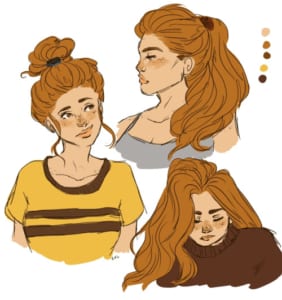
Unfortunately, I haven’t done the math but from my fairly subjective impression, Ginny gets more lines and becomes more present with each book: first through occasionally joining conversations when the Trio and often the twins are hanging out with each other in the common room in Prisoner of Azkaban, then having to reject accompanying Harry to the Yule Ball in Goblet of Fire, forcing him to ask Padma, and then through actually resolving major plot points, for example when she makes it clear to Harry that he can’t be possessed by Voldemort.
It’s actually a quite clever way of making side characters become more prominent, but it also means that a lot of Ginny’s character development after Chamber of Secrets happens completely off-stage. While Hermione nicely explains some of it to Harry when he asks how Ginny gained the ability to speak around him after starting to date other people, it feels unsatisfactory, especially because we never see her deal with being possessed by Voldemort.
It’s also annoying because Neville’s character development, for example, is done so much better. It’s simultaneously marginal enough to not dominate the story in any way but not so marginal that it’s completely unexpected. Yes, Ginny becoming more prominent is noticeable, but only if you specifically pay attention to it the way I did. If you don’t, it feels a lot like Ginny showed up in Chamber of Secrets as a shy eleven-year-old who was possessed by the Dark Lord, then disappeared for two books and reemerged as a a sassy, sporty, fairly popular fourteen-year-old in Prisoner of Azkaban.
Awkward Teenage Love Stories
Interestingly enough, Cho’s growing prominence happened in a similar way: She first appeared in Prisoner of Azkaban as Ravenclaw’s seeker playing against Harry, then becomes Cedric’s girlfriend that Harry’s crushing on in Goblet of Fire and then becomes Harry’s actual love interest in Order of the Phoenix.
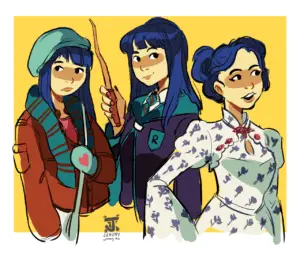
It’s a very typical teenager-y romance subplot, perfectly capturing the deep awkwardness of being fifteen, in love and completely overwhelmed. Harry hasn’t actually thought about how Cho might be feeling or how confusing and terrible the situation is for her. He also genuinely doesn’t believe she could be interested in him, even though Hermione tries to subtly encourage him, and has no idea what he’s doing—he doesn’t even seem to realize that Cho is leaning in for a kiss. At this point of the novel, it’s a bit cringe-worthy but at the same time kind of funny, heartwarming and very relateable even years after my own first awkward teenage experiences.
Additionally, the romance subplots gives us readers one of the most fun and lighthearted scenes of the book, namely Ron, Harry and Hermione talking about Harry and Cho in the Common Room. It’s one of the scenes that best shows the Trio’s friendship and affection, the way they make fun of and are exasperated by one another but also genuinely like and support each other.
The main part of the Cho subplot also takes part immediately before Harry’s vision of Arthur Weasley getting attacked by Nagini at the ministry. It’s one of the most major plot points of the novel and also the moment where the entire book turns. The focus shifts from the events at Hogwarts and Umbridge back to Voldemort and the Order. It’s a thematic shift that’s accompanied by a physical shift as well, as the main characters return to the Order’s Headquarter for Christmas. Juxtaposing it with the funny awkwardness of Harry’s first kiss is a perfect way of making sure that the book does not become too dark.
Snake Bites, Magical Medicine and Ableism
Speaking of Arthur Weasley being bitten by Nagini, I love the fact that this finally allows the readers and characters to visit St. Mungo’s Hospital for Magical Maladies and Injuries. We only ever got glimpses of magical illnesses and health care at Hogwarts but St. Mungo’s opens up a bigger window into this area of the Wizarding society. Of course, it doesn’t answer all questions. I’m still curious how exactly Muggle and Wizarding medicine can be combined or how wizards treat cancer, but it’s more than we knew before and that’s something I’m always happy about.
Additionally, some of the magical injuries JKR includes in the description of the hospital are just hilarious. There is, for example, a woman who occasionally lets out a high-pitched whistle and has steam pouring out of her mouth in a weird imitation of a human tea kettle and a man whose daughter has wings sprouting from her back and is flapping around his head.
Of course the visits to St. Mungo’s also reveal one of the more disturbing aspects of the Harry Potter world, namely that wizards and witches with lasting spell damage are essentially institutionalized in a specific ward in the Hospital. It’s a depiction that resembles the treatment of many mentally ill people, especially those deemed scary or dangerous, in the real world.
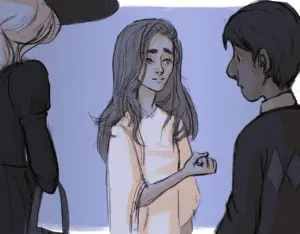
Another similarity to the way mentally ill and disabled people are treated in real life is their constant infantilization, especially by people that are meant to take care of them. Both the healer responsible for Gilderoy Lockhart, the Longbottoms and other patients and Neville’s grandmother behave in this way towards these people, talking to them as if they were little children or even a nuisance.
This made me think about how entirely possible it is to read this as simply a depiction of real life ableism that is meant to again deconstruct the idea that the Wizarding World is inherently so much better than the Muggle world. After all, this is a constant theme running through the books: bigotry exists everywhere and we must take a stand against it to change society for the better. However, unlike in other cases, like the house elves, JKR doesn’t make the characters take an explicit stand against this treatment of mentally ill people.
Gigantic Mistakes
Speaking of real-life bigotry brings me to the giants, a group of people that JKR also uses to mirror the prejudices of the real world. Giants are strongly discriminated against, to the point where they have also been the victims of ethnic cleansing like “giant hunts” that decimated their numbers and forced them to move to mountain enclaves. Literally none of them are able to live in normal Wizarding society anymore, something that is difficult even for half-giants like Hagrid.
JKR’s portrayal of bigotry against them is one the one hand fairly good as she is using it to show how being ostracized can push people towards radical right wing organizations that promise them inclusion and privileges. What JKR doesn’t reflect on in the books is the way these right wing movements often simultaneously present a serious threat to these people despite using them to push their own agenda, but to be fair, I’m not entirely sure how to incorporate it into the series either.
Another thing that JKR does well is show how authoritarian conservative characters like Umbridge tend to be deeply bigoted against not just one minority. Umbridge hates werewolves and pushed legislation that makes it impossible for most of them to find work as a result of Remus Lupin being outed as a werewolf by Snape. As mentioned already, she also treats Hagrid as if he was too stupid to understand normal human speech because he is a half-giant, a fact that she is very aware of thanks to Rita Skeeter. Her conservatism isn’t limited to ensuring that Hogwarts does not become too independent of the Ministry, it also includes her trying to keep marginalised “half-breeds” on the fringes or out of Wizarding society.
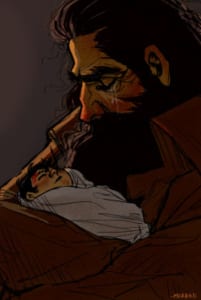
On the other hand, JKR makes a fundamental mistake in her portrayal of both the giants and the werewolves. In both cases, these groups are analogies for real world minorites—JKR even explicitly confirmed that werewolves are supposed to mirror people with AIDS—and the way they are treated is supposed to show the irrationality and wrongness of prejudices, especially through making members of each group some of the kindest, most helpful and most beloved characters of the book. But at the same time, JKR’s werewolves and giants are both hyper-violent and actually dangerous to both Wizarding and Muggle society. Werewolves like Greyback specifically target the children of people who cross them, for example, and all werewolves do become uncontrollable, deadly creatures if they don’t regularly take their potion. Giants are not just extremely brutal, they are also too stupid to stop being brutal, something that brings them even closer to complete extinction because they can’t stop fighting against one another.
This brutality is why many witches and wizards fear werewolves and giants, something that is supposed to be seen as irrational, an assessment I can’t entirely agree with. If both giants and werewolves were actually quite harmless, it would be accurate to describe being afraid of them living among “normal” humans as outrageously dumb and prejudiced. But making them actually dangerous, especially so dangerous that they can’t stop killing each other like the giants, essentially vindicates these prejudices.
I’m aware that JKR is mostly using stock fantasy creatures and their classical features. Neither giants nor werewolves are new creatures, they feature widely in fantasy, and they usually are anything but harmless. But the fact that something is a fantasy stable doesn’t mean it doesn’t have problems and can just be copied without making adjustments. Another example of this are goblin characters which are often filled to the brim with antisemitic stereotypes, specifically greediness, untrustworthiness and the classical hooked nose. Taking these classic fantasy creatures and changing them around—making werewolves actually quite harmless when transformed or all giants gentle but terribly clumsy—would have been far more subversive. It also would have significantly strengthened JKR’s anti-bigotry message.
Harry Potter Defense Squad Part II
I already expressed annoyance at how significant parts of the fandom see Harry as whiny or annoying in Order of the Phoenix despite the fact that he is a deeply traumatized fifteen-year-old who went through a whole bunch of terrible stuff that no one should have to go through. Additionally, Harry has absolutely legitimate reasons to be angry: he spends much of his summer isolated and completely in the dark about a war that deeply affects him only to learn that he is simultaneously under surveillance.
After he returns to Hogwarts, his anger takes a backseat as he tries to just live his life, but it does make a return when Hermione first suggests that he teach others Defense against the Dark Arts. He is confused why they’d even ask him in the first place which makes Ron and Hermione list his achievements. When he reacts defensively and tries to point out how much help and luck was involved in all of these situations, they start smirking, making Harry feel like they aren’t taking him or the situation seriously. This makes him lash out and yell at them:
“You don’t know what it’s like! You – neither of you – you’ve never had to face him, have you? You think it’s just memorising a bunch of spells and throwing them at him, like you’re in class or something? The whole time you’re sure you know there’s nothing between you and dying except your own – your own brain or guts – or whatever – like you can think straight when you know you’re about a nanosecond from being murdered, or tortured, or watching your friends die- they’ve never taught us that in their classes, what it’s like to deal with thinks like that – and you two sit there acting like I’m a clever little boy to be standing here, alive”
It’s a gut wrenching, massively emotional scene and one of the first time Harry actually expresses just how scary and traumatic fighting Voldemort in the graveyard actually was for him. While it’s not pretty and certainly uncomfortable for Ron and Hermione, it’s also super understandable that it makes Harry angry that they just sit there, smirking at him and listing his achievements, ignoring him trying to explain that a lot of it had more to do with luck than with his own skill or cleverness. It becomes even more understandable when you take into account that he spends a lot of his time being treated as a liar by many of his fellow students and even one of his teachers who also uses this as an excuse to physically abuse him. Harry consistently feels like people aren’t taking his experience of being almost murdered by Voldemort as seriously as they should, largely because people genuinely aren’t, and his best friends seemingly doing the same thing is deeply painful.
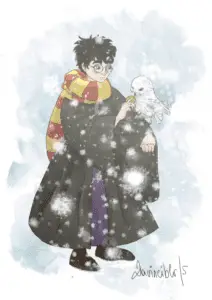
Of course Ron and Hermione recognize that they were wrong, apologize and the Trio makes up. Harry spends some comparably angst-free and even happy weeks, training the DA and kissing Cho until he witnesses Arthur being attacked. It’s another really scary moment for Harry as he first fears that people aren’t taking him seriously while Arthur, one of his father figures, is bleeding out and dying somewhere and then receives absolutely no explanation for what just happened. Even worse, the person he mainly sees as a mentor figure still essentially ignores him.
When Harry then also feels like attacking Dumbledore in the one moment when Dumbledore isn’t ignoring him, things get even more confusing for him. He already feels like it was him that attacked Arthur Weasley and is worried about what this means, so this only makes him more worried that Voldemort might be possessing him.
The only person he does share this fear with, Sirius, tries to reassure him but it only makes Harry feel dismissed and ignored. This is when he overhears Moody suggest that he might be possessed, something that seems like the most logical explanation for the situation. Because he’s immediately convinced that this is true and worried he might hurt his friends and almost-family, he isolates himself. And because Ron has the emotional range of a tea spoon, he tries to give Harry space instead of talking to him which makes Harry feel like his friends believe that he is possessed, making him resentful and isolating himself further. When he considers running away, Dumbledore orders him to stay at Grimmauld Place but gives no further advice or explanation.
Harry’s reaction is probably a bit immature: he automatically assumes the worst possible scenario is true without fact-checking it at all. But Harry is also a panicked 15 year-old. He’s already looking for an explanation of what just happened to him and not getting one and struggling to separate what he saw happening from himself when he hears Moody say that he might be possessed. It’s the only explanation he’s being given which makes it even less surprising that he immediately latches onto it.
Let’s also not forget that Harry is an abuse victim who is used to anything that goes wrong being blamed on him and being held responsible for things that have nothing to do with him. Even people who aren’t his abusers did blame him for pretty terrible things happening to him, like becoming a champion in the Triwizard Tournament. It would have been out of character for him to not assume that he’s somehow partially to blame for what happened to Arthur.
Order of the Phoenix is an incredibly intense book for Harry specifically because bad things constantly happen to him. Essentially every time it seems as if thinks are going well, something else terrible happens. When he finally gets out of Privet Drive, the threat of expulsion from Hogwarts hangs over his head. When he isn’t expelled and can return to Hogwarts, Umbridge is there, trying to make his life specifically hell. When he has managed to make it through detention with her and formed the DA, he gets banned from Quidditch. When he realises that Cho returns his feelings, he witnesses one of his father-figures getting attacked, almost dies, something that he feels responsible for and that leads people to suspect he might be possessed by Voldemort.
And of course, things will continue to only get even worse.

